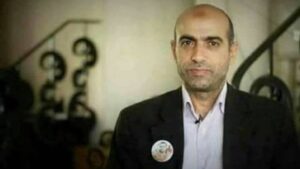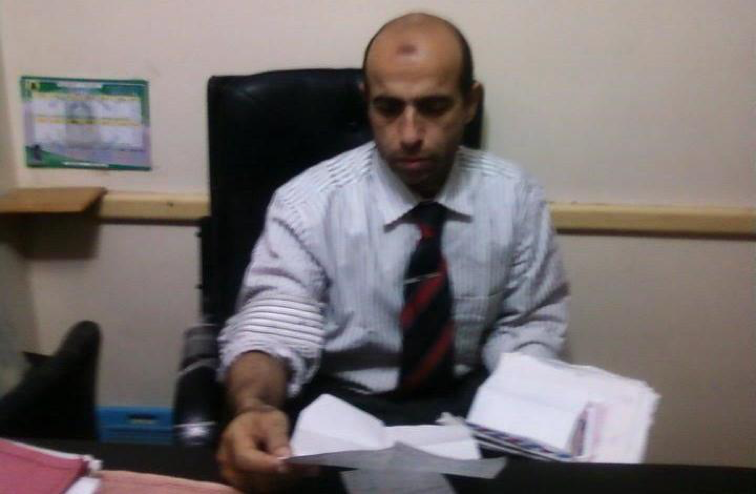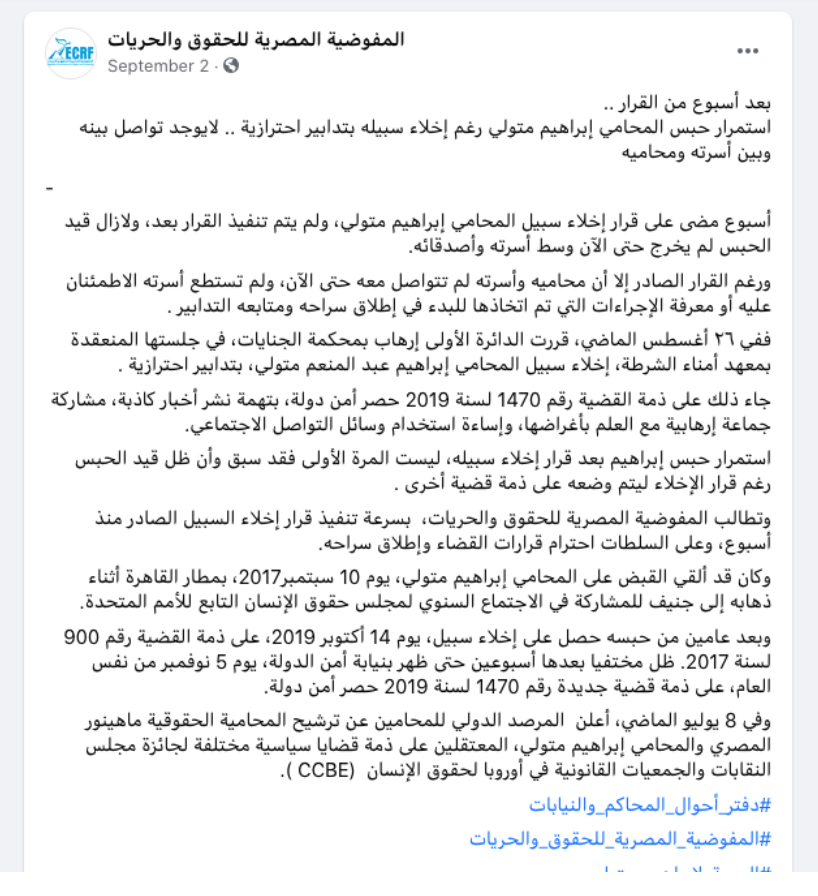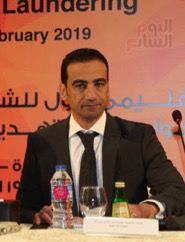Updated on February 25, 2022: On March 4, 2021, the Cairo Criminal Court's 3rd terrorism circuit renewed Hegazy's pretrial detention for 45 days.
Summary
Ibrahim Metwally Hegazy is an Egyptian lawyer and human rights defender who advocates against enforced disappearances in Egypt. Security forces arrested him on September 10, 2017. Hegazy has remained in pre-trial detention since 2017.
Methodology
DAWN researchers interviewed and communicated extensively with a source close to the detained in June and July 2020, and made use of other information from published sources that we consider reliable, as indicated below. Interviews include the following:
Source A: June 22. 2020
We do not disclose the identity of these sources to protect their security. We reference our source hereas "Source A".
Personal Background
Ibrahim Metwally Hegazy is an Egyptian lawyer and human rights defender at the Egyptian Commission for Rights and Freedoms (ECRF). Born in 1963, he is originally from Al-Riyad Center in the Kafr El-Sheikh province of Egypt.

Time and Circumstances of Arrest
According to independent Egyptian online newspaper Mada Masr, at around 9am on September 10, 2017, Hegazy was at Cairo International Airport preparing to board flight MS 771 to Geneva, Switzerland. He was travelling to participate in the 113th session of the United Nations Working Group on Enforced Disappearances (WGEID). Hegazy never made it to Geneva.

The World Organization Against Torture (OMCT) reported that Hegazy's family lost contact with him around 8am after he arrived at the airport; Hegazy texted them that he was "heading to the security forces' office." When his family contacted the Swiss authorities at the Geneva airport, they confirmed that Hegazy had not arrived on the flight from Cairo. Hegazy told his lawyer and Supreme State Security Prosecution (SSSP) security forces had arrested him at Cairo International Airport.
The security forces confiscated Hegazy's passport and took him to the headquarters of SSSP in Abbasiya. He remained forcibly disappeared for two days before appearing in front of the SSSP in Cairo on September 12, 2017.
Charges
The SSSP assigned Hegazy to State Security Case No. 900/2017. The SSSP, under the authority of Judge Kaled Diaa el-Din, the head of the SSSP, charged Hegazy with violations of the penal code and anti-terrorism law. The prosecutor has presented no witnesses or evidence to prove the alleged charges, according to source A who stated that there is no official written copy of the charges. Official legal documents pertaining to the case are not available to the defendant or his lawyer. This follows Egyptian authorities' systematic practice of depriving remanded defendants from their right to be clearly informed of the charges against them, and their rights under the Egyptian constitution and other international legal provisions.
Below is a list of the charges, obtained from ECRF:
Establishing and assuming leadership of an illegal organization: Joining an illegal group is defined as a crime in two laws in Egypt, both of which the prosecutor cited. Article 86 (repeated) of Egypt's Penal Code states, "Whoever establishes, organizes, or administers, in contravention of the provisions of the law, an association, body, organization, group or gang, whose purpose is to call for any means to disrupt the provisions of the Constitution or laws or to prevent a state institution or one of the public authorities from exercising Its actions, or assaulting the personal freedom of the citizen or other public freedoms and rights guaranteed by the Constitution and the law, or harming national unity or social peace, shall be punished with imprisonment… Anyone who assumes leadership, or leads in it, or provides material or financial aid with knowledge of the purpose for which it is called, shall be punished with temporary hard labor."
Article 12 of Egypt's Anti-Terror Law (Law No. 94 of 2015) states, " Whoever establishes, organizes, or manages a terrorist group, or assumes leadership or leadership in it, shall be punished by death penalty or life imprisonment. Temporary hard labor shall be the penalty inflicted on whoever joins a terrorist group or participates in it in any way while being aware of its objectives, and the punishment shall be temporary hard labor for a period of no less than ten years if the perpetrator receives military, security, or technical training by the terrorist group to achieve its objectives, or the perpetrator is a member of the forces armed forces or police. Whoever compels or compels a person to join a terrorist group, or prevents him from separating from it, is punished with life imprisonment. Death penalty shall be the penalty if coercion, pregnancy, or prevention results in his death." The prosecutor did not specify that Hegazy joined a terrorist group, but that can be inferred from his citation of this law.
Publishing and disseminating false news: Article 188 of the Penal Code prohibits publishing false news, stipulating:
"Whoever publishes in bad intent […] false news, statements or rumors, false or forged papers, or falsely attributed to others, if this would disturb the public peace, cause panic among people, or harm the public interest, shall be punished with imprisonment for a period not exceeding one year and a fine of no less than five thousand pounds and not exceeding twenty thousand pounds, or one of these two penalties."
Article 29 of Egypt's Anti-Terror Law (Law No. 94 of 2015) states, "Whoever establishes or uses a communications site, website, or other media for the purpose of promoting ideas or beliefs calling for the perpetration of terrorist acts or broadcasting material intended to mislead security authorities, influence the course of justice in any terrorist crime, exchange messages, issue assignments among terrorist groups or their members, or exchange information relating to the actions or movement of terrorists or terrorist groups domestically and abroad shall be punished by imprisonment with hard labor for no less than five years."
Communicating with foreign entities to harm state security: Article 14 of Egypt's Anti-Terror Law (Law No. 94 of 2015) states, "Whoever seeks or communicates with a foreign country, or any association, body, organization, group, gang, or others that has its headquarters inside or outside Egypt, or with someone who works for the interest of this foreign country or any of the aforementioned bodies, with the aim of committing or preparing to commit a terrorist crime inside Egypt, or against any of its citizens, interests, properties, headquarters and offices of its diplomatic or consular missions, institutions, or branches of its institutions abroad, or against any of those working in any of the previous bodies, or against any of those who enjoy international protection. Execution shall be the penalty if the terrorist crime subject of the pursuit or intelligence is committed, or if it is attempted."
With his release set for September 2019 — the maximum period a person can remain in pre-trial detention without a court referral — Hegazy appeared before the Supreme State Security Prosecution again in November 2019. However, the Supreme State Security Prosecutor charged him in a new case (State Security Case No. 1470/2019), accusing him of "belonging to a terrorist group" and "funding a terrorist group" and ordered a new 15 day pre-trial detention.
The SSSP ordered him released from this case as well, but then on September 7, 2020, added him to a third new case, Case No. 786/2020, after he had been ordered released under the 2019 charges. It again charged him with leading a terrorist organization, dismantling false information, and misuse of social media websites.
Egypt uses this practice, known as "recycling" cases, to allow the prosecution to start a new two-year pretrial detention period by bringing the same charges in a new case and thereby circumventing the law that limits pretrial detention to two years.
Hegazy currently remains in detention.
Trial and Legal Proceedings
- September 10, 2017
Security forces arrested Hegazy at Cairo International Airport. - September 12, 2017
The Stop Enforced Disappearance Campaign reported that Hegazy was in custody at the SSSP headquarters in Al-Tagammo' al-Khamis. Security forces searched his home during his interrogation by the SSSP. The SSSP, under the authority of Kaled Diaa el-Din, reviewed Hegazy's case and ordered a 15 day imprisonment pending investigations. They ordered his imprisonment at the Scorpion (al-Aqrab) prison at the Tora Prisons Complex in Cairo. - September 20, 2017
SSSP Prosecutor Diaa el-Din renewed the preventive detention of Hegazy for 15 days pending investigation. - December 4, 2017
SSS Prosecutor Diaa el-Din extended Hegazy's detention for another 15 days, pending investigation.Under Egyptian law, the prosecutor has the right to renew the pretrial detention for 15 days, for up to 150 days. There is no record available to DAWN about renewals in Hegazy's case during this period (December 4, 2017-May 2, 2018). However, Egyptian prosecutors presumably automatically renewed his detention.
- May 2, 2018
SSS Prosecutor Diaa el-Din referred the case to the Cairo Criminal Court, most likely because Egyptian law requires a judge to extend pretrial detention beyond 150 days. DAWN researchers were unable to ascertain the name of the judge presiding over this case.
The Cairo Criminal Court renewed the detention of Hegazy for 45 days pending further investigation, but again without establishing the legal grounds justifying pretrial detention. There is no record that DAWN was able to obtain any hearings to renew Hegazy's unlawful pretrial detention during this 15 month period. Egyptian law requires courts to renew such detentions every 45 days. The combined prosecutorial and judicial pretrial detention cannot exceed two years under Egyptian law for even the worst offenses. - September 10, 2019
The Criminal Court of Cairo rejected an appeal to release Hegazy and renewed his detention for an additional 45 days. - October 14, 2019
SSS Prosecutor Diaa el-Din ordered the release of Hegazy, as he had remained in pre-trial detention for two years, the maximum period of pre-trial detention permitted according to law. However, the SSSP did not release Hegazy and instead brought a new case against him on the same charges. - November 5, 2019
The SSSP charged Hegazy with the same violations they had brought against him in Case No. 900/2017 to permit them to start a new two-year period of pretrial detention. The SSSP in Cairo ordered the renewal of Hegazy's pretrial detention for an additional 15 days. His new case is Case No. 1470/ 2019.
There is no record that DAWN was able to obtain any hearings to renew Hegazy's unlawful pretrial detention during this six month period (November 5, 2019 – May 30, 2020). Egyptian law requires courts to renew such detentions every 45 days. The combined prosecutorial and judicial pretrial detention cannot exceed two years under Egyptian law for even the worst offenses. - May 30, 2020
The ECRF's lawyer filed a lawsuit against the prison authority arguing that the authorities violated Hegazy's legal right to see his family. The Administrative Court's first circuit in Cairo, responsible for hearing such claims, accepted the case and decided, as a matter of urgency, to halt the implementation of the Tora's Prison Authority's decision to prohibit Hegazy's family visits. However, the Prisons Authority has denied all the prison visits to all the detainees since March 9, 2020 due to the coronavirus. - August 26, 2020
On August 26, 2020, according to the ECRF, lawyer the criminal court's first circuit terrorism court ordered the release of Hegazy with probation. Hegazy was not released. Neither his lawyer or family managed to contact him, ECRF's statement said. - September 2, 2020
The detention of Hegazy continued despite the court's decision to release him. Hegazy's family was not able to communicate with him during that week.
- September 7, 2020
SSSP Prosecutor Diaa el-Din decided to recycle the charges against him in Case No. 786/2020, and ordered him into a new series of 15 days of pretrial detention.The prosecution provided no evidence to support the charges against Hegazy and presented no evidence to establish any of the statutory conditions for pre-trial detention as stipulated in Article 134 of Egypt's Code of Criminal Procedure which permits pre-trial detention only "if one of the following cases or reasons is available:
- In flagrante delicto [if the defendant was caught in the act of committing the crime] …
- Fear of the escape of the defendant
- Fear of harming the interest of the investigation , whether by influencing the victim or witnesses, or by tampering with the evidence and physical clues, or by making agreements with the rest of the perpetrators to change the truth or obscure its features.
- Preventing serious breaches of security and public order that may result from the gravity of the crime.
- However, the accused may be held in remand if he does not have a fixed permanent place of residence in Egypt, and the crime is a felony or a misdemeanor, punishable by imprisonment."
The failure of the SSSP to make clear which of the above stated preconditions were met in his case casts serious doubts on the legality of the decision to hold him in remand detention.
- October 23, 2020
The European Parliament called on the Egyptian authorities to "immediately and unconditionally release all human rights defenders detained or sentenced merely for carrying out their legitimate and peaceful human rights work," which included a specific reference to Hegazy. - November 27, 2020
The Council of Bars and Law Societies of Europe (CCBE) announced that Hegazy along with six other detained Egyptian lawyers would receive the 2020 CCBE Human Rights Award. This award recognized Hegazy and his fellow lawyers for "their courage, determination and commitment to defending human rights in Egypt." - March 4, 2021
The Cairo Criminal Court's 3rd terrorism circuit renewed Hegazy's pretrial detention for 45 days. - February 15, 2022
The Egyptian Commission for Rights and Freedoms reported that the Cairo Criminal Court renewed Hegazy's pretrial detention for 45 days.
Detention Conditions
According to a report by the UN, security forces tortured and electrocuted Hegazy, stripped Hegazy of his clothes, and poured cold water on Hegazy's body when he arrived at the headquarters of the state security agency in Al-Abbasiyya after his arrest on September 10, 2017.
State security forces imprisoned Hegazy at a maximum security prison, the Scorpion (al-Aqrab), at the Tora Prisons Complex in Cairo. The prison is notorious for its inhumane detention conditions and maltreatment of prisoners.
In a press statement on March 13, 2019, ECRF announced that Hegazy was denied family visits and doing any workout for about a year and half since his arrest in September 2017. The statement added that on March 12, 2019, a ECRF's lawyer submitted a complaint (No.26/2019) to the Maadi Public prosecution to transfer Hegazy to Al Qasr Al Aiyni Hospital to receive the proper medical care. The complaint mentioned that Hegazy suffered from eye damage, caused by the lack of exposure to sunlight, and hand tremors. Hegazy had also lost weight and grown pale, according to the complaint.
Hegazy's family told Arabi 21 in November 2019 that prison authorities had deprived him of exercise and have not allowed him to receive family visits between January-November 2019 even though the public prosecutor granted him permission to do so. The family added that his health had deteriorated in prison and that prison authorities at al-Aqrab Prison had deprived him of proper health care. According to Source A, before his detention, Hegazy suffered from a severe prostate infection and nerve tremors, but his condition grew worse while in prison.
Impact on Family
Hegazy's son, Amr Ibrahim Metwally Hegazy, has been forcibly disappeared since 2013. Since his arrest on July 8, 2013 in Cairo, Amr's whereabouts remain unknown. Amr was 22-years-old when he disappeared.
According to Source A, while the SSSP prosecutor was investigating Hegazy, security forces broke into Hegazy's house on September 20, 2017 in Kafr El-Sheikh.
As his family's only breadwinner, Hegazy's detention means his family is now struggling economically.
Violation of Rights
Hegazy's case demonstrates flagrant violations of both national and international law by the Egyptian government.
The right to freedom and security
Unidentified security forces have unlawfully deprived Hegazy of his liberty without presenting him with an arrest warrant or allowing him to contact a family member or lawyer. [Article 14, Arab Charter on Human Rights; Article 9 (1), the International Covenant on Civil and Political Rights (ICCPR); Article 3, 9, Universal Declaration of Human Rights (UDHR)].
According to Article 54 of the Egyptian constitution: "Personal freedom is a natural right which is safeguarded and cannot be infringed upon. Except in cases of in flagrante delicto, citizens may only be apprehended, searched, arrested, or have their freedoms restricted by a causal judicial warrant. All those whose freedoms have been restricted shall be immediately informed of the causes therefore, notified of their rights in writing, be allowed to immediately contact their family and lawyer, and be brought before the investigating authority within twenty-four hours of their freedoms having been restricted."
The right to communicate with the outside world, especially with his family
While in pre-trial detention, security forces have prevented Hegazy from seeing and communicating with his family. [Article 54, Egypt's constitution; Article 21, Arab Charter on Human Rights; Article 12, UDHR; Article 17 (1, 2), ICCPR; Principle 19, Body of Principles for the Protection of All Persons under Any Form of Detention or Imprisonment; Rule 37, 39, 79, 92 Standard Minimum Rules for the Treatment of Prisoners]
The right to humane treatment and the prohibition of torture
Unidentified security forces tortured and electrocuted Hegazy, stripped Hegazy of his clothes, and poured cold water on Hegazy's body when he arrived at the headquarters of the state security agency in Al-Abbasiyya after his arrest on September 10, 2017. According to Article 55 of Egypt's constitution, "All those who are apprehended, detained or have their freedom restricted shall be treated in a way that preserves their dignity. They may not be tortured, terrorized, or coerced."
While in pre-trial detention, not only have security forces prevented him from seeing his family, but they also have tortured and deprived Hegazy of proper medical care, according to his family.
Egypt became a member of the Convention against Torture and Other Cruel, Inhuman or Degrading Treatment or Punishment in 1986. Hegazy's severe torture by the security forces clearly violates the rules of the Convention.
[Article 51-52, 55, Egypt's constitution; Article 40, Egyptian Code of Criminal Procedure; Article 126, Egyptian Code of Criminal Procedure; Principle 6, Body of Principles for the Protection of All Persons under Any Form of Detention or Imprisonment; Article 5, African Charter on Human and Peoples' Rights; Article 5, UDHR; Article 7, ICCPR; Article 2, 10 (1, 2), 16, Convention against Torture and Other Cruel, Inhuman or Degrading Treatment or Punishment (CAT)]
The right not to be subjected to enforced disappearance
Security forces forcibly disappeared Hegazy for two days before he appeared before the SSSP.
[The International Convention for the Protection of All Persons from Enforced Disappearance (Convention CED); Principle 1, 6, Principles on the Effective Prevention and Investigation of Extra-legal, Arbitrary and Summary Executions].
Egypt has not signed the International Convention for the Protection of All Persons from Enforced Disappearance.
Officials Involved in Prosecution and Detention
Judge Kaled Diaa el-Din, Head Of the SSSP

Prosecutor Diaa el-Din is listed on all of the SSSP decisions to hold and extend the unlawful pre-trial detention, including Hegazy.
Under Diaa el-Din's leadership, the SSSP exercised its prosecutorial discretion to bring criminal charges against human rights and political activists, including Hegazy, for peaceful speech and political activity, in violation of their rights to freedom of expression and association.
El-Din is also responsible for prosecutorial decisions to hold these activists in pretrial detention, by issuing prosecutorial orders to detain, requesting judicial orders to detain and appealing judicial decisions ordering release from pretrial detention. El-Din is also responsible for the abusive practice of bringing new charges against defendants , including Hegazy, who have already been subject to pretrial detention, in order to circumvent the two-year limit on pretrial detention and, in some cases, to keep people in multiple rounds of pretrial detention that lasts for years.
International Reactions
Many international human rights organizations, including Amnesty International, Front Line Defenders, and the Office of United Nations High Commissioner for Human Rights (OHCHR), have denounced Hegazy's arrest.
During the 36th Session of the United Nations Human Rights Council (UNHRC) in September 2017, the German representative said,
Recognizing the challenges Egypt is facing, Germany nonetheless remains seriously concerned about its human rights situation. Under the guise of countering terrorism, the repression against and systematic silencing of civil society is increasing, inter alia through arbitrary detention, travel bans, asset freezes, black-listing, intimidation, and the blocking of websites. Germany is deeply concerned about the growing number of reported cases of torture in detention, enforced disappearances, and extra-judicial killings.
In November 2019, the UN condemned Hegazy's detention and urged the Egyptian authorities to release the detainee. On September 15, 2017, the Chair of WGEID and the Special Rapporteur on the situation of human rights defenders expressed dismay about Hegazy's arrest.
On November 4, 2017, the ambassadors to Egypt from Canada, Germany, Italy, the Netherlands, and the UK all expressed concerns over Hegazy's detention. The countries urged Egyptian authorities "to ensure the freedom of civil society and the protection from torture that are enshrined in the Egyptian constitution."
On November 5, 2017, Egypt's Foreign Ministry summoned the ambassadors of Germany, Italy, and the Netherlands to protest their statement criticizing the detention of Hegazy and calling for the respect of civil society groups, saying their statement on the issues was "unacceptable and a blatant interference in domestic affairs."
On November 27, 2020, the Council of Bars and Law Societies of Europe announced granting the 2020 CCBE Human Rights Award to Hegazy along with six other detained Egyptian lawyers. The award is a recognition of his outstanding commitment and sacrifice to uphold the core fundamental values of the legal profession.
On October 12, 2021, the Egyptian Initiative for Personal Rights (EIPR) issued a statement that Hegazy's life is in grave danger, as he has been suffering from an enlarged and severe inflammation of the prostate for more than a year. This medical issue requires urgent medical intervention to avoid serious complications that threaten Hegazy's life. EIPR's lawyers stated that Hegazy was not provided with adequate medical treatment in his detention, nor was he allowed to obtain it, even at his own expense, despite the many requests made by his relatives to the Egyptian authorities.





































